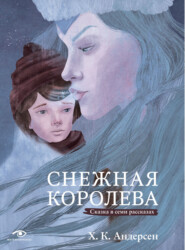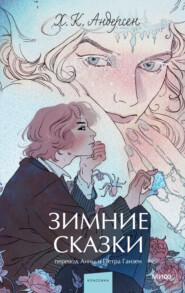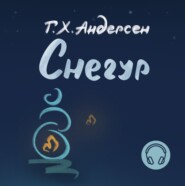По всем вопросам обращайтесь на: info@litportal.ru
(©) 2003-2024.
✖
The Sand-Hills of Jutland
Настройки чтения
Размер шрифта
Высота строк
Поля
Another helpless being soon made its appearance, and her new-born babe was placed in her arms. It ought to have reposed on a stately couch, with silken curtains, in a splendid house. It ought to have been welcomed with joy to a life rich in all this world's goods; but our Lord had ordained that it should be born in a peasant's hut, in a miserable nook. Not even one kiss did it receive from its mother.
The fisherman's wife laid the infant on its mother's breast, and it rested near her heart; but that heart had ceased to beat – she was dead! The child who should have been nurtured amidst happiness and wealth was cast a stranger into the world – thrown up by the sea among the sand-hills, to experience heavy days and the fate of the poor. And again we call to mind the old song: —
"The king's son's eyes with big tears fill:
'Alas! that I came to this robber-hill.
Here nothing awaits me but evil and pain.
Had I haply but come to Herr Buggé's domain,
Neither knight nor squire would have treated me ill.'"
A little to the south of Nissumfiord, on that portion of the shore which Herr Buggé had formerly called his, the vessel had stranded. Those rough, inhuman times, when the inhabitants of the west coast dealt cruelly, it is said, with the shipwrecked, had long passed away; and now the utmost compassion was felt, and the kindest attention paid to those whom the engulfing sea had spared. The dying mother and the forlorn child would have met with every care wherever "the wild wind had blown;" but nowhere could they have been received with more cordial kindness than by the poor fishwife who, only the previous morning, had stood with a heavy heart by the grave wherein reposed her child, who on that very day would have attained his fifth year if the Almighty had permitted him to live.
No one knew who the foreign dead woman was, or whence she came. The broken planks and fragments of the ship told nothing.
In Spain, at that opulent house, there never arrived either letter or message from the daughter and son-in-law; they had not reached their destination; fearful storms had raged for some weeks. They waited with anxiety for months. At last they heard, "Totally lost – every one on board perished!"
But at Huusby-Klitter, in the fisherman's cottage, there dwelt now a little urchin.
Where God bestows food for two, there is always something for a third; and near the sea there is plenty of fish to be found. The little stranger was named Jörgen.
"He is surely a Jewish child," said some people, "he has so dark a complexion."
"He may, however, be an Italian or a Spaniard," said the priest.
The whole tribe of fishermen and women comforted themselves that, whatever was his origin, the child had received Christian baptism. The boy throve, his noble blood mantled in his cheek, and he grew strong, notwithstanding poor living. The Danish language, as it is spoken in West Jutland, became his mother tongue. The pomegranate seed from the Spanish soil became the coarse grass on the west coast of Jutland. Such are the vicissitudes of life!
To that home he attached himself with his young life's roots. Hunger and cold, the poor man's toil and want, he was to experience, but also the poor man's joys.
Childhood has its bright periods, which shine in recollection through the whole of after life. How much had he not to amuse him, and to play with! The entire seashore, for miles in length, was covered with playthings for him – a mosaic of pebbles red as coral, yellow as amber, and pure white, round as birds' eggs, all smoothed and polished by the sea. Even the scales of the dried fish, the aquatic plants dried by the wind, the shining seaweed fluttering among the rocks – all were pleasant to his eye, and matter for his thoughts; and the boy was an excitable, clever child. Much genius and great abilities lay dormant in him. How well he remembered all the stories and old ballads he heard; and he was very quick with his fingers. With stones and shells he would plan out whole scenes he had heard as if in a picture: one might have ornamented a room with these handiworks of his. "He could cut out his thoughts with a stick," said his foster-mother; and yet he was but a little boy. His voice was very sweet – melody seemed to have been born with him. There were many finely-toned strings in that breast; they might have sounded forth in the world, had his lot been otherwise cast than in a fisherman's house on the shores of the German Ocean.
One day a ship foundered near. A case was thrown up on the land containing a number of flower-bulbs. Some took them and put them into their cooking pots, thinking they were to be eaten; others were left to rot upon the sand; none of them fulfilled their destination – to unfold the lovely colours, the beauty that lay in them. Would it be better with Jörgen? The poor flower-roots were soon done for: there might be years of trial before him.
It never occurred to him, or to any of the people around him, to think their days lonely and monotonous: there was abundance to do, to hear, and to see. The ocean itself was a great book; every day he read a new page in it – the calm, the swell of the sea, the breeze, the storm. The beach was his favourite resort; going to church was his event, his visit of importance, though of visits there was one which occasionally took place at the fisherman's house that was particularly welcome to him. Twice a year his foster-mother's brother, the eel-man from Fjaltring, up near Rovbierg, paid them a visit. He came in a painted cart full of eels. The cart was closed and locked like a chest, and painted with blue, red, and white tulips; it was drawn by two dun-coloured bullocks, and Jörgen was allowed to drive them.
The eel-man was a very good-natured, lively guest. He always brought a keg of brandy with him; every one got a dram of it, or a coffee-cup full if glasses were scarce; even Jörgen, though he was but a little fellow, was treated to a good thimbleful. That was to keep down the fat eels, said the eel-man; and then he never failed to tell a story he had often told before, and, when people laughed at it, he immediately told it over again to the same persons; but this is a habit with all talkative individuals; and as Jörgen, during the whole time that he was growing up, and into the years of his manhood, often quoted phrases in this story, and applied them to himself, we may as well listen to it.
"Out in the rivulet dwelt eels, and the eel-mother said to her daughters, when they begged to be allowed to go a little way alone up the stream. 'Do not go far, lest the horrible eel-spearer should come, and take you all away.'
"But they went very far, and of eight daughters only three returned to their mother, and these came wailing, 'We only went a short way from the door, when the terrible eel-spearer came and killed our five sisters.' 'They will come back again,' said the eel-mother. 'No,' said the daughters, 'for he skinned them, cut them in pieces, and fried them.' 'They will come again,' repeated the mother. 'Impossible, for he ate them.' 'They will come again,' still persisted the eel-mother. 'But he drank brandy after he had eaten them,' said the daughter. 'Did he? Oh! oh! then they will never come again,' howled the mother. 'Brandy buries eels.'
"And therefore one must always drink a little brandy after that dish," said the eel-man.
And this story made a great impression on little Jörgen, and partly influenced his life. He took the tinsel for the gold. He also wished to go "a little way up the stream" – that is to say, to go away in a ship to see the world – and his mother said as the eel-mother had done. "There are many bad men – eel-spearers." But a little way beyond the sand-hills, and a little way on the heath, he was allowed to go, he begged so hard. Four happy days, however – days that seemed the brightest among his childish years, turned up: he was to go to a large meeting. What pleasure, although it was to a funeral!
A relation of the fisherman's family, who had been in easy circumstances, was dead. The farm lay inland – "eastward, a little to the north," it was said. The father and mother were both going, and Jörgen was to accompany them. On leaving the sand-hills, they passed over heaths and boggy lands, until they came to the green meadows where Skjærumaa winds its way – the river with the numerous eels, where the eel-mother with her daughters lived, those whom the cruel man speared and cut in pieces, though there were men who had scarcely treated their fellow-men better. Even Herr Buggé, the knight who was celebrated in the old song, was murdered by a wicked man; and though he was himself called so good, he wished to put to death the builder who had built for him his castle, with its tower and thick walls, just where Jörgen and his foster-parents stood, where Skjærumaa falls into the Nissumfiord. The sloping bank or ascent to the ramparts was still to be seen, and red fragments of the walls still marked out the circumference of the ancient building. Here had Herr Buggé, when the builder had taken his departure, said to his squire – "Follow him, and say, Master, the tower leans to one side. If he turns, slay him on the spot, and take the money from him that he got from me; but, if he does not turn, let him go on in peace." And the squire overtook the builder, and said what he was ordered to say; and the builder replied, "The tower does not lean to one side, but by and by there will come from the westward one in a blue cloak, and he will make it bend." A hundred years afterwards this prediction was fulfilled, for the German Ocean rushed in, and the tower fell; but the then owner of the property, Prebjörn Gyldenstierne, erected a habitation higher up, and that stands now, and is called Nörre-Vosborg.
Jörgen, with his foster-parents, had to pass this place. Of every little town hereabout he had heard stories during the long winter evenings; now he saw the castle, with its double moats, its trees and bushes, its ramparts overgrown with bracken. But the most beautiful sight was the lofty linden trees, that filled the air with so sweet a perfume. Towards the north-west, in a corner of the garden, stood a large bush with flowers that were like winter's snow amidst summer's green. It was an elder tree, the first Jörgen had ever seen in bloom. That and the linden trees were always remembered during his future years as Denmark's sweetest perfume and beauty, which the soul of childhood "for the old man laid by."
The journey soon became more extended, and the country less wild. After passing Nörre-Vosborg, where the elder tree was in bloom, he had the pleasure of travelling in a sort of carriage, for they met some of the other guests who were going to the funeral feast, as it might be called, and were invited into their conveyance. To be sure they had all three to stuff themselves into a very narrow back seat, but that was better, they thought, than walking. They drove over the uneven heaths; the bullocks which drew their cart stopped whenever they came to a little patch of green grass among the heather. The sun was shining warmly, and it was wonderful to see, far in the distance, a smoke that undulated, yet was clearer than the air – one could see through it: it was as if rays of light were rolling and dancing over the heath.
"It is the Lokéman, who is driving his sheep," was told Jörgen, and that was enough for him. He fancied he was driving into the land of marvellous adventures and fairy tales; yet he was only amidst realities. How still it was there!
Far before them stretched the heath, but it looked like a beautifully variegated carpet; the ling was in flower, the Cyprus-green juniper bushes and the fresh oak shoots seemed like bouquets among the heather. But for the many poisonous vipers, how delightful it would have been to roll about there! The party spoke of them, and of the numerous wolves that had abounded in that neighbourhood, on account of which the district was called Ulvborg-Herred. The old man who was driving related how, in his father's time, the horses had often to fight a hard battle with these now extirpated wild animals; and that one morning, on coming out, he found one of his horses treading upon a wolf he had killed; but the flesh was entirely stripped from the horse's legs.
Too quickly for Jörgen did they drive over the uneven heath, and through the deep sand. They stopped at length before the house of mourning, which was crowded with strangers, some inside, some on the outside. Vehicle after vehicle stood together; the horses and oxen were turned out amidst the meagre grass; large sand-hills, like those at home by the German Ocean, were to be seen behind the farm, and stretched far away in wide long ranges. How had they come there, twelve miles inland, and nearly as high and as large as those near the shore? The wind had lifted them and removed them: they also had their history.
Psalms were sung, and tears were shed by some of the old people, otherwise all was very pleasant thought Jörgen. Here was plenty to eat and drink – the nicest fat eels; and it was necessary to drink brandy-snaps after eating them, "to keep them down," the eel-man had said; and his words were acted upon here with all due honour.
Jörgen was in, and Jörgen was out. By the third day he felt himself as much at home here as he had done in the fisherman's cottage, where he had lived all his earlier days. Up here on the heath it was different from down there, but it was very nice. It was covered with heather-bells and bilberries; they were so large and so sweet; one could mash them with one's foot, so that the heather should be dripping with the red juice. Here lay one tumulus, there another; columns of smoke arose in the calm air; it was the heath on fire, they said, it shone brightly in the evening.
The fourth day came, and the funeral solemnities were over – the fisherman and his family were to leave the land sand-hills for the strand sand-hills.
"Ours are the largest though;" said the father, "these are not at all important-looking."
And the conversation fell on how they came there, and it was all very intelligible and very rational. A body had been found on the beach, and the peasants had buried it in the churchyard; then commenced a drifting of sand – the sea broke wildly on the shore, and a man in the parish who was noted for his sagacity advised that the grave should be opened, to ascertain if the buried corpse lay and sucked his thumb; for if he did that, it was a merman whom they had buried, and the sea would force its way up to take him back. The grave was accordingly opened, and lo! he they had buried was found sucking his thumb; so they took him up instantly, placed him on a car, harnessed two oxen to it, and dragged him over heaths and bogs out to the sea; then the sand drift stopped, but the sand-hills have always remained. To all this Jörgen listened eagerly; and he treasured this ancient legend in his memory, along with all that had happened during the pleasantest days of his childhood – the days of the funeral feast.
It was delightful to go from home, and to see new places and new people; and he was to go still farther away. He went on board a ship. He went forth to see what the world produced; and he found bad weather, rough seas, evils dispositions, and harsh masters. He went as a cabin-boy! Poor living, cold nights, the rope's end, and hard thumps with the fist were his portion. There was something in his noble Spanish blood which always boiled up, so that angry words rose often to his lips; but he was wise enough to keep them back, and he felt pretty much like an eel being skinned, cut up, and laid on the pan.
"I will come again," said he to himself. The Spanish coast, his parents' native land, the very town where they had lived in grandeur and happiness, he saw; but he knew nothing of kindred and a paternal home, and his family knew as little of him.
The dirty ship-boy was not allowed to land for a long time, but the last day the ship lay there he was sent on shore to bring off some purchases that had been made.
There stood Jörgen in wretched clothes, that looked as if they had been washed in a ditch and dried in the chimney: it was the first time that he, a denizen of the solitary sand-hills, had seen a large town. How high the houses were, how narrow the streets, swarming with human beings; some hurrying this way, others going that way – it was like a whirlpool of townspeople, peasants, monks, and soldiers. There were a rushing along, a screaming, a jingling of the bells on the asses and the mules, and the church bells ringing too. There were to be heard singing and babbling, hammering and banging; for every trade had its workshop either in the doorway or on the pavement. The sun was burning hot, the air was heavy: it was as if one had entered a baker's oven full of beetles, lady-birds, bees, and flies, that hummed and buzzed. Jörgen scarcely knew, as the saying is, whether he was on his head or his heels. Then he beheld, at a little distance, the immense portals of the cathedral; light streamed forth from the arches that were so dim and gloomy above; and there came a strong scent from the incense. Even the poorest, most tattered beggars ascended the wide stairs to the church, and the sailor who was with Jörgen showed him the way in. Jörgen stood in a sacred place; splendidly-painted pictures hung round in richly-gilded frames; the holy Virgin, with the infant Jesus in her arms, was on the altar amidst flowers and light; priests in their magnificent robes were chanting; and beautiful, handsomely-dressed choristers swung backwards and forwards silver censers. There was in everything a splendour, a charm, that penetrated to Jörgen's very soul, and overwhelmed him. The church and the faith of his parents and his ancestors surrounded him, and touched a chord in his heart which caused tears to start to his eyes.
From the church they proceeded to the market. He had many articles of food and matters for the use of the cook, to carry. The way was long, and he became very tired; so he stopped to rest outside of a large handsome house, that had marble pillars, statues, and wide stairs. He was leaning with his burden against the wall, when a finely-bedizened porter came forward, raised his silver-mounted stick to him, and drove him away – him, the grandchild of its owner, the heir of the family; but none there knew this, nor did he himself.
He returned on board, was thumped and scolded, had little sleep and much work. Such was his life! And it is very good for youth to put up with hard usage, it is said. Yes, if it makes age good.
The period for which he had been engaged was expired – the vessel lay again at Ringkiöbingfiord. He landed, and went home to Huusby-Klitter; but his mother had died during his absence.
The winter which followed was a severe one. Snow storms drove over sea and land: one could scarcely face them. How differently were not things dealt out in this world! Such freezing cold and drifting snow here, whilst in Spain was burning heat, almost too great; and yet when, one clear, frosty day at home, Jörgen saw swans flying in large flocks from the sea over Nissumfiord, and towards Nörre-Vosborg, he thought that the course they pursued was the best, and all summer pleasures were to be found there. In fancy he saw the heath in bloom, and mingling with it the ripe, juicy berries; the linden trees and elder bushes at Nörre-Vosborg were in flower. He must return there yet.
Spring was approaching, the fishing was commencing, and Jörgen lent his help. He had grown much during the last year, and was extremely active. There was plenty of life in him; he could swim, tread the water, and turn and roll about in it. He was much inclined to offer himself for the mackerel shoals: they take the best swimmer, draw him under the water, eat him up, and so there is an end of him; but this was not Jörgen's fate.
Among the neighbours in the sand-hills was a boy named Morten. He and Jörgen left the fishing, and they both hired themselves on board a vessel bound to Norway, and went afterwards to Holland. They were always at odds with each other, but that might easily happen when people were rather warm-tempered; and they could not help showing their feelings sometimes in expressive gestures. This was what Jörgen did once on board when they came up from below quarrelling about something. They were sitting together, eating out of an earthen dish they had between them, when Jörgen, who was holding his clasp-knife in his hand, raised it against Morten, looking at the moment as white as chalk, and ghastly about the eyes. Morten only said, —
"So you are of that sort that will use the knife!"
Scarcely had he uttered these words before Jörgen's hand was down again; he did not say a syllable, ate his dinner, and went to his work; but when he had finished that, he sought Morten, and said, —
"Strike me on the face if you will – I have deserved it. There is something in me that always boils up so."
"Let bygones be bygones," said Morten; and thereupon they became much better friends. When they returned to Jutland and the sand-hills, and told all that had passed, it was remarked that Jörgen might boil over, but he was an honest pot for all that.
"But not of Jutland manufacture – he cannot be called a Jutlander," was Morten's witty reply.
They were both young and healthy, well-grown, and strongly built, but Jörgen was the most active.
Up in Norway the country people repair to the summer pastures among the mountains, and take their cattle there to grass. On the west coast of Jutland, among the sand-hills, are huts built of pieces of wrecks, and covered with peat and layers of heather. The sleeping-places stretch round the principal room; and there sleep and live, during the early spring time, the people employed in the fishing. Every one has his Æsepige, as she is called, whose business it is to put bait on the hooks, to await the fishermen at their landing-place with warm ale, and have their food ready for them when they return weary to the house. These girls carry the fish from the boats, and cut them up; in short, they have a great deal to do.

















